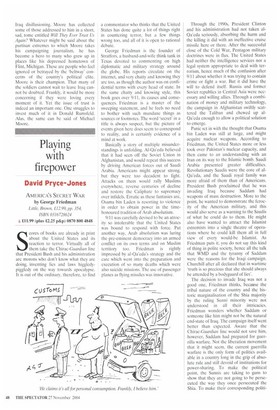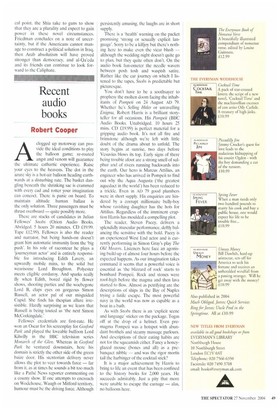Playing with firepower
David Pryce-Jones
AMERICAS SECRET WAR by George Friedman Little, Brown, £12.99, pp. 354, ISBN 0316728624 & £11.99 (plus £2.25 p&p) 0870 800 4848 Scores of books are already in print about the United States and its reaction to terror. Virtually all of them take the Chirac-Guardian line that President Bush and his administration are morons who don't know what they are doing, inventing lies and laws higgledypiggledy on the way towards apocalypse. It is out of the ordinary, therefore, to find
a commentator who thinks that the United States has done quite a lot of things right in countering terror, but a few things wrong too, and all of it is open to rational debate.
George Friedman is the founder of Stratfors, a husband-and-wife think tank in Texas devoted to commenting on high diplomatic and military strategy around the globe. His reports circulate on the interne( and very chatty and knowing they are too, as though the author was on confidential terms with every head of state. In the same chatty and knowing style, this book goes over 9/11, its causes and consequences. Friedman is a master of the sweeping statement, and he feels no need to bother with such mundane things as sources or footnotes. The word 'secret' in a title is always suspect, but the picture of events given here does seem to correspond to reality, and is certainly evidence of a mind at work, Basically a story of multiple misunderstandings is unfolding. Al-Qa'eda believed that it had seen off the Soviet Union in Afghanistan, and would repeat this success by driving American forces out of Saudi Arabia. Americans might appear strong, but they were too decadent to fight. Attacks on them would rally Muslims everywhere, reverse centuries of decline and restore the Caliphate to supremacy over infidels. Erratic as these fantasies are, Osama bin Laden is resorting to violence in order to obtain power in the timehonoured tradition of Arab absolutism.
9/11 was carefully devised to be an atrocity so intolerable that the United States was bound to respond with force. Put another way, Arab absolutism was luring the pre-eminent democracy into an armed conflict on its own terms and on Muslim territory too. Friedman is rightly impressed by al-Qa'eda's strategy and the care which went into the preparation and execution of so many deaths which were also suicide missions. The use of passenger planes as flying missiles was innovative. Through the 1990s, President Clinton and his administration had not taken alQa'eda seriously, absorbing the harm and the killing it did with an ineffective cruise missile here or there. After the successful close of the Cold War, Pentagon military doctrines were in flux. The United States had neither the intelligence services nor a legal system appropriate to deal with terrorism, hence much of the confusion after 9/11 about whether it was trying to contain crime or fight a war. But it did have the will to defend itself. Russia and former Soviet republics in Central Asia were necessary and willing allies. Through a combination of money and military technology, the campaign in Afghanistan swiftly scattered the Taliban and chewed up alQa'eda enough to allow a political solution to emerge.
Panic set in with the thought that Osama bin Laden was still at large, and might acquire nuclear weapons. According to Friedman, the United States more or less took over Pakistan's nuclear capacity, and then came to an understanding with an Iran on its way to the Islamic bomb. Saudi Arabia presented greater difficulties. Revolutionary Saudis were the core of alQa'eda, and the Saudi royal family was more afraid of them than of Americans. President Bush proclaimed that he was invading Iraq because Saddam had weapons of mass destruction. More to the point, he wanted to demonstrate the ferocity of the American military, and this would also serve as a warning to the Saudis of what he could do to them. He might also have wanted to attract the Islamist extremists into a single theatre of operations where he could kill them all in full view of every would-be Islamist. As Friedman puts it, you do not say this kind of thing in polite society, hence all the talk that WMD and the tyranny of Saddam were the reasons for the Iraqi campaign. Churchill after all declared that in wartime 'truth is so precious that she should always be attended by a bodyguard of lies'.
The decision to invade Iraq was not a good one, Friedman thinks, because the tribal nature of the country and the historic marginalisation of the Shia majority by the ruling Sunni minority were not understood in all their intricacies. Friedman wonders whether Saddam or someone like him might not be the natural end-state of Iraq. The campaign itself went better than expected. Aware that the Chirac-Guardian line would not save him, however, Saddam had prepared for guerrilla warfare. Not the liberation movement that it might seem, the current guerrilla warfare is the only form of politics available in a country long in the grip of absolute rule and still devoid of institutions for power-sharing. To make the political point, the Sunnis are taking to guns to show that they are not going to be persecuted the way they once persecuted the Shia. To make their corresponding politi cal point, the Shia take to guns to show that they are a plurality and expect to gain power in these novel circumstances. Friedman concludes on a note of uncertainty, but if the Americans cannot manage to construct a political solution in Iraq, then Arab absolutism will have proved stronger than democracy, and al-Qa'eda and its friends can continue to look forward to the Caliphate.



















































































 Previous page
Previous page